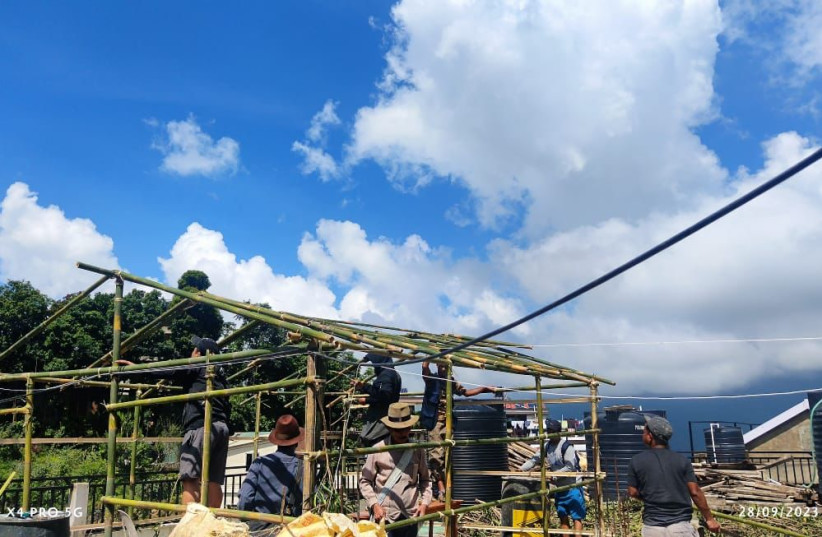The Bnei Menashe Jewish community of northeastern India will gather to celebrate the Sukkot holiday this week, despite widespread violent unrest that has targeted this ethnic Jewish minority in the region since May 2023.
This community, which numbers roughly 5,000 total inside India, has become a victim of ethnic tensions in the northern state of Manipur. The world’s most populous nation has seen attacks on Bnei Menashe Jews carried out by local tribes since May 3 when ethnic majority Meiteis and the tribal minority Kukis began a violent conflagration experts say had been building up for years.
According to Shavei Israel, an NGO that helps “lost tribe” Jewish communities immigrate to Israel, over 1,000 members of the community, or 20% of their total, have been displaced amid the violence. One community member was killed – Yoel Baite, a father of 4 – while another was shot in the chest and hospitalized. Jewish centers such as synagogues and mikvaot (ritual baths) have been burned down.
“Despite these challenging times for the Bnei Menashe and even in the farthest reaches of northeastern India, they have continued to uphold the ancient tradition of building Sukkot in honor of the festival,” said Shavei Israel Founder and Chairman Michael Freund. “We fervently hope that next year, they will be able to do so in Israel.”

Shavei Israel, which has promoted the aliyah of Bnei Menashe Jews to Israel for two decades, has thus far opened a relief center to assist more than 1,100 Bnei Menashe who have sought refuge there. The organization’s staff have been arranging for temporary shelter for the families and have been distributing food to victims. In addition, Shavei Israel has given diapers and baby formula to parents with infants, medicine to the sick and elderly, and has also purchased clothing items since many of the refugees were forced to leave their belongings behind.
Shavei Israel is also extending their helping hand behind their new relief center. Shavei Israel staff are helping 200 refugees in Kangpokpi, Manipur, 350 refugees in the border town of Moreh, and 350 people in the neighboring state of Mizoram.
Who are the Bnei Menashe?
The Bnei Menashe claim to be descendants of the Ten Lost Tribes of Israel, who were sent into exile by the Assyrian Empire more than 27 centuries ago. Their ancestors wandered through Central Asia and the Far East for centuries, before settling in what is now northeastern India, along the borders of Burma and Bangladesh.
Throughout their sojourn in exile, the Bnei Menashe continued to practice Judaism just as their ancestors did, including observing the Sabbath, keeping kosher, celebrating the festivals, and upholding other Jewish traditions. Bnei Menashe Jews continued to practice their traditions while dreaming of someday returning to the land of their ancestors.
“Thus far, more than 2,000 Bnei Menashe (representing 40% of the entire community in all of northeastern India) have been forced to flee their homes,” said Freund about the recent unrest. “This figure is nearly double the number that had been displaced just two months ago, as the situation has continued to deteriorate. Nearly all those who have fled have been left destitute.”
Freund and the Shavei Israel Foundation hope to help the Bnei Menashe avoid further persecution and fulfill their dream of returning to the Jewish homeland.
